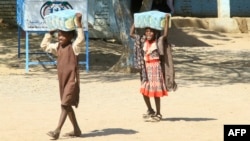The baby was a newborn when the war broke out in Sudan. No one knew how old she was because her biological mother was missing.
A 20-year-old refugee, Ghufran Hamed Al-Nour, took responsibility for the baby, referred to as Deborah in this report.
"I feel like I am her mother," said Ghufran. "I feel pity for her for the things we went through in Sudan."
The two sat on an old hospital bed in a refugee transit camp health facility in Renk, a South Sudanese town near the border with Sudan. They came to the facility for a checkup because Deborah wasn't feeling well.
Deborah was carried out of Sudan by a woman fleeing violence. At the border, the charity Save the Children International took custody of her, then handed her to Ghufran, a young woman whose life was also disrupted by the Sudan conflict.
"I will raise her like my daughter," Ghufran said.
'They killed my parents'
On April 11, 2023, a 12-year-old boy traveled from Kenya to Khartoum, where he had planned to spend his holiday with his parents. Three days later, fighting broke out. By the following day, he had lost both parents to the war.
"My mother and my father, they go to search for work," said the boy, referred to as John in this report. "They killed my parents."
These are the sad tales of Sudanese children who are paying the price of a year-long conflict that has claimed thousands of lives and torn apart countless families.
Most refugees are children
Pornpun Jib, director of Save the Children's operation in South Sudan, said the majority of those fleeing the war in Sudan are under 18 years old.
"Since the war broke out in Sudan — over 600,000 arrivals in total, of both returnees and refugees — have arrived in South Sudan, through the Joda border into Renk," said Jib. "Over 300,000 — which is over half of the total arrival — are children. A lot of them came unaccompanied or separated."
John and nearly all the children at this camp don't attend school. Most of them spend their time at a "safe space" built by Save the Children and partners — a big field in Renk where they run, play football and make art.
"When I come here, I find football," said the boy. "I play."
This is how most of the children are kept busy.
Jib said he hopes that by playing different sports, children such as John can forget the trauma of violence back at home.
"This might seem small to a lot of adults, but to the children, this could be the world," said Jib. "A lot of them that we spoke to also told us point blank — they don't want football or basketball or new clothes. A lot of them just want to go back to school."
John said he misses his old life.
"When I am in Kenya, I am in school," he said. "No school here and no money. No something to eat."
Unlike baby Deborah, who has someone to take care of her, John spends most of his time in the safe space run by Save the Children.
Nobody knows whether Deborah's mother is still alive. But the baby — now about 1 year old — does have someone to care for her.
"The most important thing," said Ghufran, "is that I found her."












